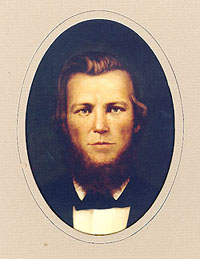Pendleton Murrah
| Pendleton Murrah | |
|---|---|
 |
|
| 10th Governor of Texas | |
|
In office November 5, 1863 – June 17, 1865 |
|
| Lieutenant | |
| Preceded by | Francis R. Lubbock |
| Succeeded by | Andrew Jackson Hamilton |
| Member of the Texas House of Representatives | |
|
In office 1857 |
|
| Personal details | |
| Born | 1824 or 1826 Alabama |
| Died |
(aged about 40) Monterrey, Mexico |
| Political party | Democratic |
| Spouse(s) | Sue Ellen Taylor |
| Profession | Politician |
Pendleton Murrah (1824/1826 – August 4, 1865) was the tenth Governor of Texas. His term in office coincided with the American Civil War.
Murrah's birth date and birth location vary from source to source. Some have him born in 1824; others give his birth year as 1826. According to his 1850 and 1860 entries in the U.S. Census, Murrah was a native of Alabama. His birth place is sometimes listed as South Carolina, but more recent sources indicate he was born in Bibb County and was the illegitimate son of Peggy Murrah, a daughter of Charles and Avarilla Jones Murrah. He was raised and educated in a Baptist orphanage, and graduated from Brown University in 1848. He then studied law and was admitted to the bar. He moved to Texas and opened a law practice in Marshall.
After losing a race in 1855, Murrah won election to the Texas House of Representatives in 1857, and also served on the executive committee of the Texas Democratic Party. In 1861 he declined to run for a seat in the Confederate Congress because of ill health, probably tuberculosis, but his health recovered sufficiently that he accepted a commission in the 14th Texas Infantry, a Confederate Army unit commanded by former governor Edward Clark. Murrah soon resigned his commission, but he won the gubernatorial election in 1863, and served until the fall of the Confederacy.
As governor during the American Civil War, Murrah emphatically supported the Confederate cause, although he ended up in a controversy over the conscription of Texas militia troops into the Confederate Army. Still, even after Robert E. Lee surrendered in 1865, he encouraged Texans to continue the revolution.
...
Wikipedia
